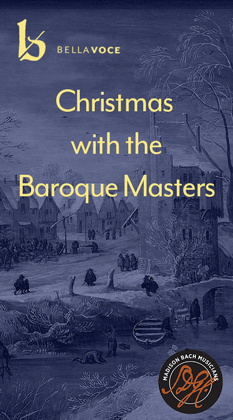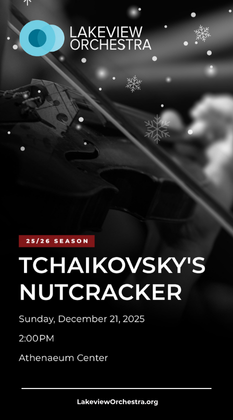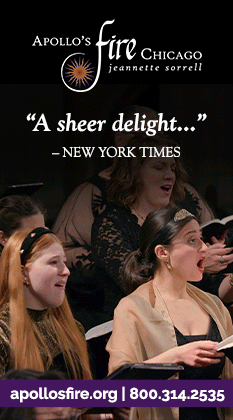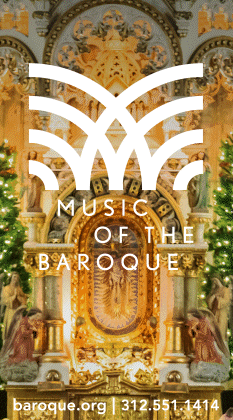Performances
Salieri’s “Falstaff” proves delightful fun in COT’s clever updating
Verdi’s Falstaff of 1893 is a bona-fide masterpiece. Antonio Salieri’s stage […]
Glover, MOB herald the season with a lively and moving “Messiah”
At a time of year when performances of Messiah tend to […]
Chicago Chorale revisits Rachmaninoff’s “All-Night Vigil” with spiritual insight and fervor
This is the time of year when Handel’s Messiah begins to […]
Articles
Critic’s Choice
Gluck: Orfeo ed EuridiceDame Jane Glover/Music of the BaroqueSeptember 14-15 Music […]
Concert review
Compelling Aucoin premiere sparks a thrilling evening with Popelka, CSO
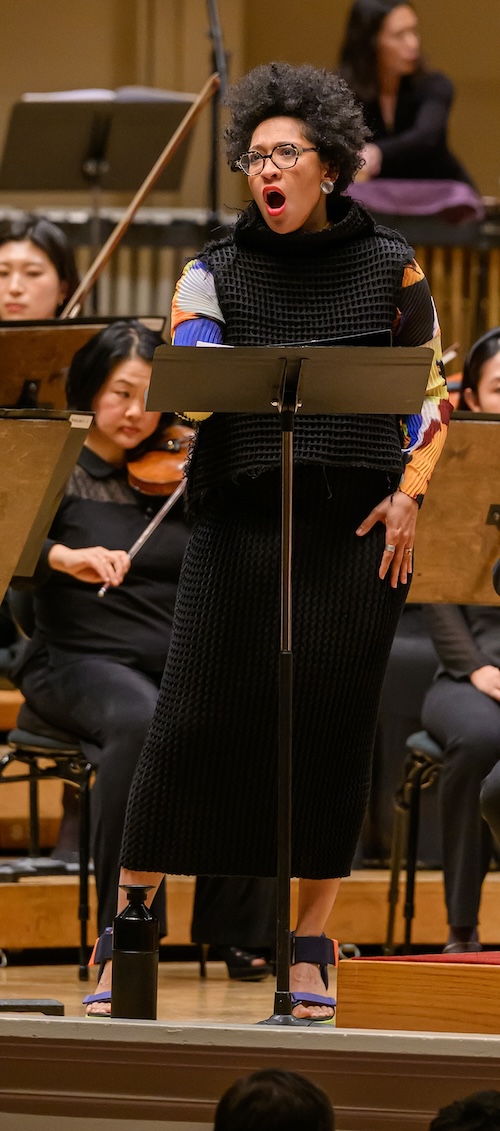
Holiday concerts tend to dominate the local musical landscape this time of year but the Chicago Symphony Orchestra is wrapping 2025 with some intriguing programs and a trio of diverting one-week podium stands, culminating with music director designate Klaus Mäkelä.
Thursday night’s concert marked the return of Petr Popelka to Orchestra Hall. The Czech conductor divided opinion in his CSO debut last year, subbing for an ailing Herbert Blomstedt. But on this occasion Popelka proved a most impressive advocate and spirited CSO collaborator throughout a challenging and diverse program.
The main order of business was the world premiere of Song of the Reappeared by Matthew Aucoin—the sole CSO commission of the 2025-26 season.
A former Solti Conducting Apprentice with the CSO who worked with Riccardo Muti a decade ago, Aucoin has been making waves more recently with his composing. His opera Eurydice, was presented at the Met in 2021 (and revived in Boston last year in a reduced orchestration). Aucoin’s Music for New Bodies was unveiled this past summer and just last month he joined Conor Hanick in the New York premiere of his Sources of Lift for two pianos.
Song of the Reappeared draws on poems by the Chilean writer Raúl Zurita, who was imprisoned and tortured under the repressive Pinochet regime. Scored for soprano and large forces, Aucoin sets three of Zurita’s poems in a mini-song cycle of sorts, which he calls “a concerto for voice and orchestra.” Though the composer avoids drawing any parallels between the Pinochet era and contemporary American politics, in an interview in the CSO program Aucoin’s intent seems clear. The composer states that he was invigorated by Zurita’s art “as a nonviolent and life-affirming yet also unyielding form of resistance” [in] “the difficult moment we’re all living through.”
Aucoin composed his work with Julia Bullock in mind, and the American soprano was the soloist in this premiere, making her downtown CSO debut.
The title of Song of the Reappeared reflects those Chilean citizens who were “disappeared”—i.e., murdered—by the government under Pinochet. The first song, “El mar” (The Sea) references the regime’s horrific practice of dropping bodies of some Pinochet victims from helicopters into Chile’s lakes, oceans and mountains. The song opens the cycle with a two-note wind motif set against pulsing strings. The soloist sings “Strange baits rain from the sky,” reflecting the political victims dropped from above. There are violent episodes for the roiling orchestra between the sung stanzas. The music contains falling motifs that reflect the victims’ descent, closing with the line “Heavy with strange seed plowed fields cover the sea.”

The central song, “Una ruta en las soledades” (A Path in the Solitudes) is the heart of Aucoin’s work. The setting begins with a plaintive, searching solo for English horn—expressively rendered by Scott Hostetler—which is prominent throughout the movement. The poem’s speaker addresses their deceased beloved, killed in the regime’s atrocities. A pensive, searching introspection reigns through the somewhat grisly text yet Bullock brought an emotional sense of longing to the vocal lines. Before the final stanza, a lumbering orchestral motif grows into a massive relentless crescendo with angular trumpet fragments that scream like alarms or sirens. Zurita’s images in the final stanzas become increasingly mystical, at times florid in Marquezian style, as the music grows into an ardent love song to a resurrected apparition of the lover (“And I will love you again”) and a final reprise of the English horn solo.
The final setting “Rompientes” (Breakers) brings an almost jarringly optimistic release from the foregoing horror and loss, presumably reflecting a post-Pinochet Chile. The soloist sings of “the flight of the new ocean and of the breakers in the sky” in music cast in a proto-minimalist style with fast, motoric violin figures. The song ends on a firm (and high) note of defiance; the soloist sings “they killed us and we died and the breakers of resurrection glided above us” capped by a final flourish of renewed strength from the orchestra.
Matthew Aucoin’s Song of the Reappeared is a most impressive achievement—powerful, well-crafted and deeply and sincerely felt. Early on the high writing for the soprano soloist is a bit relentless but the vocal line becomes more varied and nuanced in the latter two sections. While Aucoin’s work calls for large forces, the score is balanced skillfully with the most unbridled orchestral climaxes kept to standalone sections without the soloist.
Julia Bullock’s voice faded fitfully in her lower register and at times one wanted a more varied expressive palette and wider range of vocal hues. Yet for the most part, Bullock gave the launch of Aucoin’s work stellar advocacy, tackling the punishing high tessitura with facility and bringing emotional ardency to the Spanish texts.
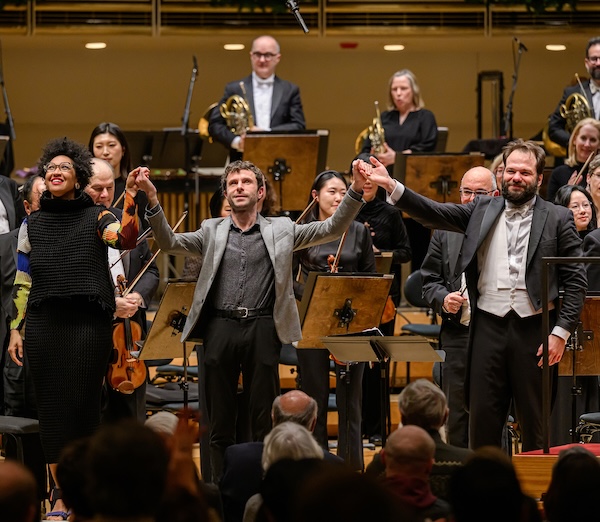
Conductor Popelka deserves great credit for balancing the large forces masterfully, allowing every strand to register without ever overwhelming the soloist. The CSO musicians were clearly engaged and energized by Aucoin’s score, performing the music with unerring polish and total commitment.
It’s too bad attendance was so light for the only world premiere of this CSO season. Still, despite the small numbers, Aucoin’s new work received enthusiastic cheers and ovations, as the composer took the stage to share in the applause with Popelka, Bullock and the orchestra.
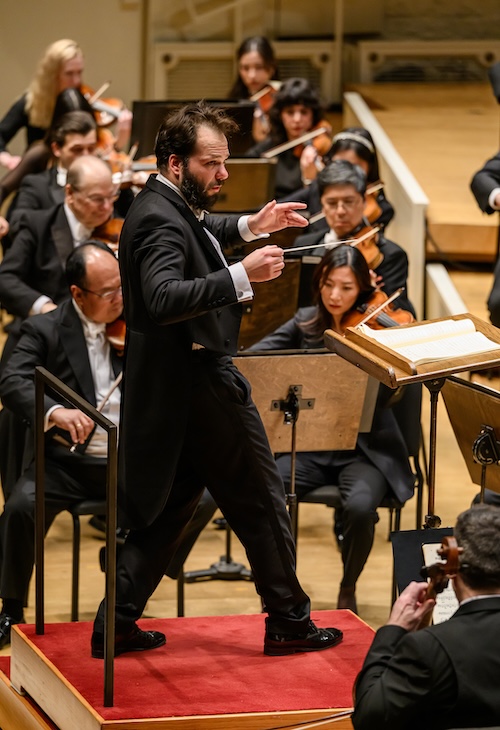
The program framed the Aucoin premiere with music of Brahms and Strauss—presumably box office-friendly bait to balance the new piece but unsuccessful on this occasion judging by the swathes of empty seats. Thursday night’s frigid temperatures likely didn’t help.
Popelka was largely just as impressive in Brahms’ Third Symphony, directing a tensile, concentrated performance. The Czech maestro has an unorthodox, vertical conducting style yet elicited consistently focused and responsive playing from the musicians, a couple ragged entrances apart. He judged the tricky tempo fluctuations of the outer movements deftly, taking the first movement repeat, and balancing textures with striking transparency.
The Andante proved less successful, with the conductor taking it at more of a brisk and technocratic Moderato that felt too impatient, not allowing Brahms’ bucolic lyricism to breathe.
The ensuing third movement was ideally judged, however, and the CSO musicians were at their finest with gracious wind playing and a buoyant singing line in the strings. The taut and forceful finale conveyed the assertive confidence of the music, Popelka letting the brass off the leash yet gracefully slowing down to the quiet coda.
Richard Strauss’s Till Eulenspiegel’s Merry Pranks closed the evening. This shortest and lightest of the composer’s ten tone poems relates the misadventures of the title German trickster, leading to his arrest and execution yet Till’s subversive spirit has the last word.
Strauss’s musical humor in this work can seem as distant and inscrutable to contemporary audiences as Milton Berle. Yet Popelka led a swaggering performance that blew the dust off this familiar music. Under his direction, the players’ hair-trigger virtuosity put across every joke, rimshot, and backflip of the bumptious prankster in thrilling fashion with high-stepping exuberance. Principal horn Mark Almond and clarinetist John Bruce Yeh vividly characterized Till’s themes while Robert Chen contributed elegant violin solos.
The program will be repeated 1:30 p.m. Friday, 7:30 p.m. Saturday and 3 p.m. Sunday. cso.org
Posted in Performances
1 Comment
Calendar
December 6
Chicago Symphony Orchestra
Petr Popelka, conductor
Julia Bullock, soprano […]
News
Winberg to step down as CEO of Grant Park Music Festival
It is the end of an era for the Grant Park […]

